#it's also interesting that as the webcomic gives characters fewer experiences they also have less opportunity to change
Explore tagged Tumblr posts
Text
Morality pets redux
Some parts of this I've posted here before. In the light of the manga's Psychic Sisters arc, I thought it was worth putting my thoughts together. Long-ass post.
"I don’t believe our lives change completely for the better at a short notice. It’s all the small progress we make that’s important ..." -- ONE, interviewed in Yamada Reiji’s Young Sunday ep. 30.
I'm here to talk about characters changing their lives as a result of an important interaction. Part A will seem quite obvious to many, but I ask you to bear with me as it's the foundation from which to build.

A: The Moment
For a guy who doesn't believe in sudden changes, ONE sure has a lot of characters seeming to do just that. Morality pets, the characters who force other characters to look into themselves and learn to be better people, have been a staple of One-Punch Man since the beginning. They're everywhere!
To pick a few (there are many more):
Saitama had the Butt-Chinned kid. His entire destiny changed because of this child.
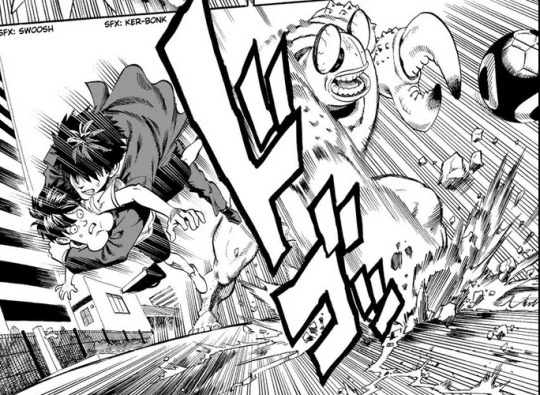
The seminal moment (chapter 2)
Garou has Tareo.
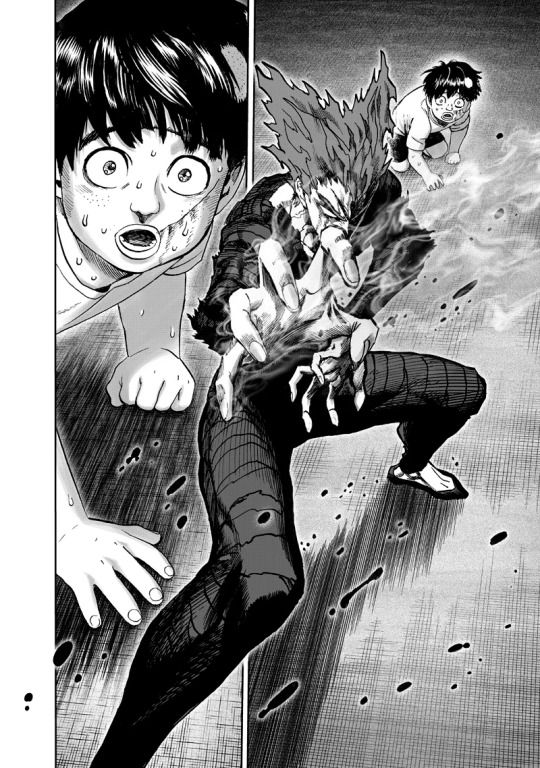
There's nothing he wouldn't do for this kid (chapter 91 online /93 in print)
Genos gets Tatsumaki. Somehow, this cranky, complicated little asshole whose hands are none too clean and who’d savage him nearly as happily as she does monsters is just what the doctor ordered for his personal development. No one said morality pets had to be cute or helpless!
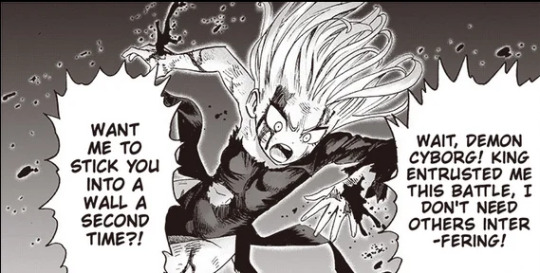
Feisty, isn't she? Yet she's got things to teach (chapter 133 online/137 in print)
And Tatsumaki has Saitama.
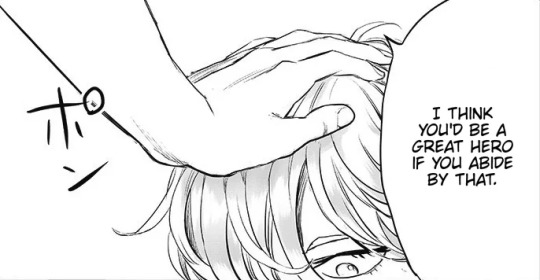
chapter 182
B: Before the Moment
“Look at a stone cutter hammering away at his rock, perhaps a hundred times without as much as a crack showing in it. Yet at the hundred-and-first blow it will split in two, and I know it was not the last blow that did it, but all that had gone before.” ― Jacob August Riis (1849-1914)
So how do we address the contradiction between what ONE says he writes and what we see? By noting that every apparently Damascene conversion turns out to have roots. The reason the Morality Pets are so for the characters is that they force into focus a moral issue the characters have been struggling with and get the characters to make a decision about the issue.
Saitama
Saitama's encounter with the butt-chinned kid and Crablante was not the first time he'd thought of becoming strong enough to fight monsters. He'd been desperately hating being weak even back in middle school, and had been muscle training since.

So he decided to do something about it (extra chapter: 200 Yen)
What Crablante brought into focus was that becoming so strong that he could defeat any monster was something he wanted to 100% do, rather than something he worked on in between work. More importantly, it was something he wanted to do to be a hero. I'll revisit this in the next section.

Chapter 2
Genos
Genos confronted two important philosophical questions that have troubled him. The first is who needs help. Heroes help those who can't so the direction of travel is allegedly clear -- help flows from the strong to the weak, so the stronger you are, the less help you need/deserve/get. When he sets out to follow after Tatsumaki and help her, we see him consider that question explicitly, remembering Saitama coming through for Mumen Rider. The answer to who needs help is anybody, regardless of capability. Which is a radical change to the sense of noblesse oblige that prevails unexamined.
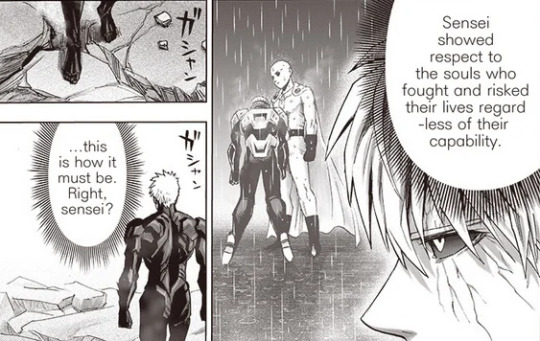
What is a hero for, if they're not for everyone? (chapter 143)
The second is another that's troubled him for a long long while: where the balance of destroying enemies versus protecting others lies. Genos has been as strict a utilitarian as Metal Knight is, with the difference that he's willing to lay down in front of the trolley himself if need be. The cold logic of the matter is that if there's any innocent people to kill to stop a terrible threat from killing many more people, heroes are the right people to kill. They're the people who are prepared to die for others. Genos acknowledges explicitly that killing heroes would have been something he'd do without hesitation if the outcome was that a monster as terrible as Black Sperm didn't escape.

To sacrifice a few to save many more would seem moral (chapter 150)
So what changed the calculus? Tatsumaki. By working so closely with her, she ceased to be a hero in the abstract, or even just a person. She was the person he’s flown in the teeth of one of the most terrifying monsters ever to give her space to work. She’s the person he’s plunged down a mile to summon help for, then clambered back up to guard her when she could no longer protect herself. She’s the person he’s carried in his arms, giving his back to every obstacle and blow so as to keep safe. Furthermore, he’s seen and empathises with Fubuki’s fear for her sister’s well-being and that impels him to try that much harder for Tatsumaki. And Tatsumaki is a person who really, really doesn't want to die.
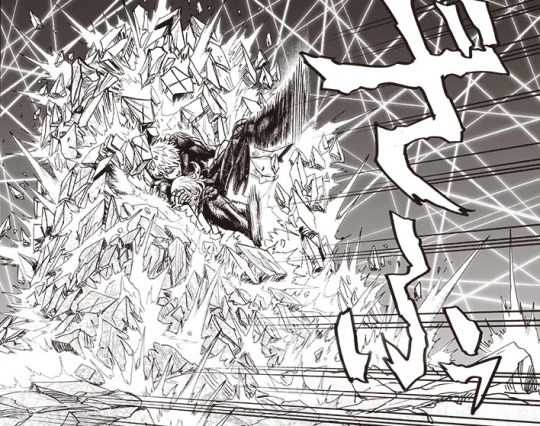
But when 'heroes' ceases to be an abstract concept and becomes a small, scared woman who trusts you... (chapter 145)
Therefore, when push came to shove, the question wasn't 'are you going to kill a dozen heroes to save millions of lives?' It was: 'are you going to kill Tatsumaki? Is that your idea of justice? REALLY?' It's at that point that he gets on top of her to shield her from being stamped to death, to protect her come what may. It might not have worked out as well as it did in the end, but no matter: Genos has decided that his path to justice and strength does not lie in strategically sacrificing others.

...somehow, the 'moral' sacrifice cannot be countenanced (chapter 150)
Tatsumaki
Tatsumaki might have surprised some for not appearing to change when Genos had quite graphically showed her that others could indeed help her. Quite simply, she wasn't yet in the right place. It's worth noting that she had reached out to Fubuki to help her extract Psykos and it couldn't have gone any worse: all her worst fears appeared to be validated. The enemy was all too real, Fubuki's hangers-on had a traitor in their midst, and the ones who weren't traitorous were too weak to be of any help. And yet, when she looks around the room, is it with a sense of vindication at having all her warnings come to pass? No, it's with sadness: she's sad that it's come to this yet again.
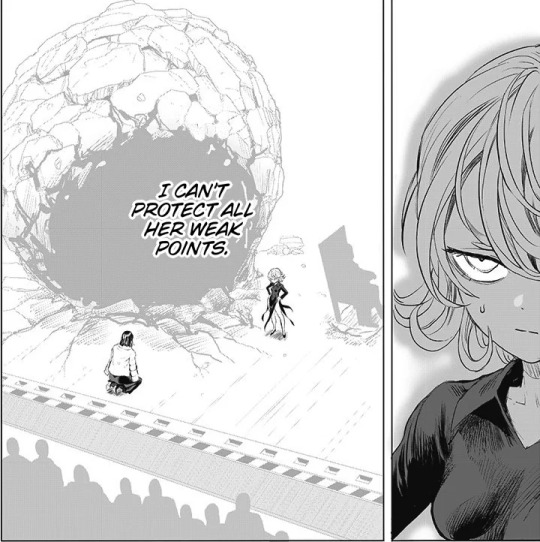
Rarely has a person been sadder to be able to say 'I told you so' (chapter 177)
She really wants things to go differently but she can't see how. And that's how it comes to be that she's prepared to change what she does to not end up all alone again.
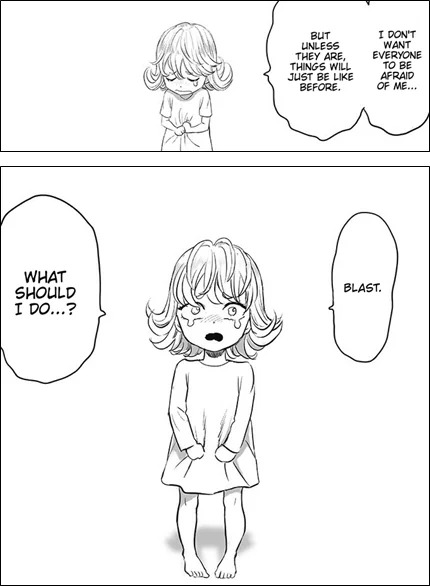
Surely there has to be another way (chapter 182)
C: Afterlife of The Moment
“A farmer went out to sow his seed... Some fell on rocky places, where it did not have much soil. It sprang up quickly, because the soil was shallow. But when the sun came up, the plants were scorched, and they withered because they had no root..." Matthew 13:3-6 (NIV)
No epiphany, no matter how strong, will last unless there's a way to support it. ONE has been no slouch in exploring the way in which epiphanies turn into lasting change.
Saitama
Back when Saitama was still new in his hero journey, his neighbourhood was still populated, and being thanked by people he helped was the thing that gave him the strength to persist through his travails.

What gave his struggles meaning (extra chapter 'Brushing up')
Indeed, when we first get to hear Saitama's thoughts, we find that what's getting him down (other than fights being boring) is that he can no longer see that his actions have any positive effect on the world. His neighborhood was empty -- everyone having fled for their lives -- and monsters kept coming day after day.

Once he lost people around him, he started to lose himself (chapter 5)
The reason that saving the ugly child had been so important to him comes back to him when he's looking at the bodies of the fallen heroes, slain by Cosmic Garou. He'd been so lost in the sauce of seeking personal gratification that he'd forgotten that he'd become a hero to help others. It might involve great fights, but that had never been the point. Tragically, he realised it too late. Luckily for him (and to stop the story from ending too soon), Saitama's gotten a do-over. Only he's forgotten. Oh dear.

Remembering what mattered too late (chapter 166)
Genos
In the aftermath of King (really Garou) appearing to scatter the cadres and Saitama arrive to check on him, we see Genos doubting himself. He'd already been unsure if he'd done the right thing. Maybe what he'd really done was to chicken out because he wasn't prepared to die. So he asks Saitama. Getting the answer that not throwing his life away was indeed a sign of strength, it was the validation he needed to commit to a new path. What that path will look like, ah, we just have to wait and see.

Most necessary validation. Also, geeze Genos, learn to take a compliment, will ya? (chapter 155)
Tatsumaki
While it's too early to know what will happen, the fact that Tatsumaki has a sister who loves and trusts her enough to already have a relationship with her, and who is interested in having a better realtionship with her is a good start.

It helps a lot that those two actually like each other (chapter 176)
The way we see her at the end of chapter 182, standing with the Blizzard Group, is grounds for cautious optimism that she will be able to learn a new way of relating to others. It won't be perfect or perfectly smooth sailing, but what in this story is?

This is better than sitting miserable and alone again -- let's hope it sticks! (chapter 182)
D: No Freebies
Right, let's sum up. There's a reason insurance companies jack up premiums for drivers who have been in accidents: people really suck at learning from experience. Until we decide that we are ready to learn, things that happen to us are just things that happen. Even if it's our fault. This has no relationship to IQ, unfortunately.
Many stories are fond of the life-changing moment, and in particular, the life-changing interaction with another person. What ONE has been doing is to dig into this idea a bit more (each statement is <20 words).
The life-changing interaction is something seen as important by the actor.
They find this important because something within them has them open to change and the interaction addresses it.
Life-changing moments only become life-changing with ongoing reinforcement.
I think overall that it's a more realistic way of approaching personal change than many stories do it.
And that's me. What do you think?
#OPM#manga#meta#long#Saitama#Tatsumaki#Genos#what appears to be sudden change turns out to have both roots and a support system#and while ONE isn't telling a big story of a small change in OPM he's very mindful of the ethos with which he wrote MP100#it's also interesting that as the webcomic gives characters fewer experiences they also have less opportunity to change#ONE doesn't cheat and tell us that the manga interactions are happening off-screen in the wc#it's all not over by a long chalk: looking forward to seeing how the characters continue to change
59 notes
·
View notes